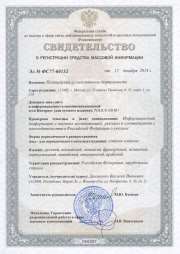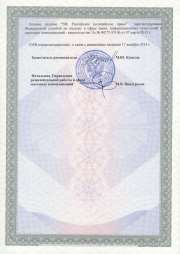MAIN PAGE
> Journal "Police and Investigative Activity"
> Contents of Issue № 02/2019
Contents of Issue № 02/2019
Zokina (Romanenko) A.M., Bukalerova L.A. - It is necessary to improve the legal mechanism of traffic safety ensuring and transport operation in Russia
|
|
pp. 1-12
|
DOI: 10.25136/2409-7810.2019.2.29328
Abstract: The improvement of the mechanism of legal protection should be based on profound social and scientific grounds. The research object is social relations aimed at ensuring safety of a person, society and state from threats connected with vehicles operation in the Russian Federation. The research subject is the set of legal acts in the field of transport safety and Russia’s administrative and criminal legislation in the field of responsibility for dangerous operation of motor vehicles. The body of general scientific and specific legal research methods helps formulate the insights. In the result of studying the problems of criminal responsibility for dangerous operation of motor vehicles, the author distinguishes a repressive and a moderate repressive approaches. It is supposed that it would be justified to return a provision establishing responsibility for leaving the scene of an accident into the chapter 27 of the Criminal Code of the Russian Federation in order to increase drivers’ responsibility and reduce traffic accident rate.

|
The police and protection of human rights |
Popova E.I., Krasnopeev I.S., Garmaeva D.A. - Legal awareness of aggrieved persons as one of the ways of ensuring their rights and legitimate interests
|
|
pp. 13-20
|
DOI: 10.25136/2409-7810.2019.2.29462
Abstract: Protection of rights and legitimate interests of aggrieved persons is one of the most important tasks of law-enforcement agencies. At the same time, this task is not always solved in practice. The research subject of this study is the possibilities of legal education of aggrieved persons aimed at ensuring their rights and legitimate interests. The purpose of the study is the analysis of law-enforcement practice in this direction and the development of recommendations for the most effective usage of legal education of the above mentioned non-professional participants of criminal proceedings aimed at ensuring proper protection of their rights and legitimate interests. To solve this task, the authors use the general method of scientific cognition of and special scientific methods including synthesis, analysis, forecasting, comparison, etc. Based on the analysis of law enforcement practice, the authors find out that despite a large scope of rights granted to aggrieved persons, often they are not observed because their bearers are not aware of them. The authors give special attention to the need for legal education of aggrieved persons and offer to use the achievements of the forensic science for this purpose. The authors describe the key directions and forms of creating and introducing scientifically-grounded recommendations for aggrieved persons aimed at ensuring real protection of their rights and legitimate interests.

|
Preventative work of the police |
Garmaev Y.P., Ladoshkin A.S., Garmaeva D.A., Vasil'eva L.G. - The notion and the signs of crimes connected with evidence tampering in civil and arbitration proceedings (criminalistic aspect)
|
|
pp. 21-28
|
DOI: 10.25136/2409-7810.2019.2.29521
Abstract: Crimes connected with evidence tampering in civil and arbitration proceedings are not only widespread, but also highly latent. Judicial practice needs a system of scientifically grounded recommendations which could improve combating these criminal acts. The research subject is the detection, investigation and solution of crimes connected with evidence tampering in civil and arbitration proceedings. In this context, the purpose of this article is to define the key criteria of creating a system of criminalistic recommendations aimed at raising the effectiveness of the above mentioned areas of activity of law enforcement bodies officers. The authors use the general method of the reality cognition, and the system, formal-logical and sociological methods, analysis, synthesis, modeling and abstraction. Based on the analysis of judicial practice, the authors conclude that the criminalistic approach to the essence of the notion of evidence tampering (article 303 of the Criminal Code of the Russian Federation) doesn’t conform with the aims and tasks of criminalistic studies. To be used for creating the appropriate criminalistic technique, this notion should be wider and should include several types of accompanying crimes: 1) against justice, 2) economic and corruption crimes, 3) crimes involving violence against the trial participants, 4) other crimes. Criminologically important peculiarities of the accompanying crimes should also be taken into account, such as the specificity of the situation, subjects and their goals, the typical lucrative impulse, etc. The authors formulate the criminologically significant definition of a group of crimes if this type and substantiate the reason for forming a specific criminalistic technique of investigating crimes connected with evidence tampering in civil and arbitration proceedings.

|
The police and issues in the fight against corruption |
Stepanenko D.A., Stepanenko R.A. - Tactical operation “Detaining a corruption mediator (supposed conciliator) - and then a bribe recipient - with a mainour”
|
|
pp. 29-39
|
DOI: 10.25136/2409-7810.2019.2.29608
Abstract: Mediation in bribery giving is hard to be detected and proved. Law enforcement practice lacks effective methods of combating crimes connected with mediation in bribery giving and graft (art. 291.1 and 204.1 of the Criminal Code of the Russian Federation), and supposed mediation usually qualified as fraud (art. 159 of the Criminal Code). The subject of this research is the scope of possibilities of conducting a tactical operation “Detaining a corruption mediator (supposed conciliator) - and then a bribe recipient - with a mainour” in order to improve these crimes combating. The aim of this research is to define the elements of this tactical operation and the opportunities to conduct it to improve the effectiveness of detecting, solving and investigating mediation in bribery giving. The authors use the dialectical method of scientific cognition, general scientific and specific methods including synthesis, analysis, forecasting, comparison and others. Based on the analysis of scientific discussion and investigative practice and precedents, the authors describe the algorithm of conducting this tactical operation which usually has two stages: actions in relation to a corruption mediator (supposed mediator) and then - a bribe recipient, if there was any. Special attention is given to the preparation phase of the first stage, and the presence of the reasons for operative-investigative operations, and elaboration of sound trial prospects of the future criminal case even before its opening. The authors conclude that the offered system of tactical and criminalistic recommendations, if it is used, can improve the effectiveness of combating mediation in bribery giving.

|
Informational support of the police |
|
Rednikova T.V., Averina K.N. - Topical problems of legal protection of natural reserves in the Russian Federation
|
|
pp. 40-47
|
DOI: 10.25136/2409-7810.2019.2.29872
Abstract: The research subject is the problem aspects of legal protection of natural reserves in the Russian Federation. The authors consider the evolution of the legislation in this area and the current legal norms of the Russian Federation in the area of environmental protection regulating the creation of natural reserves, the formation of their legal regimes, which are the object of criminal infringement formalized in the article 262 of the Criminal Code of Russia. The authors search for the problem aspects of law-enforcement of this regulation and also for the ways to improve it. The conclusions of the research are based on the results of the analysis of international, Russian and foreign legislation in the area of protection of the environment and biological diversity and its components, regulating the usage of natural reserves and the peculiarities of imposing criminal responsibility for the violation of the natural resources regime. Legal responsibility is a traditional instrument with a preventional impact, on the one hand, which prevents people from illegal actions, and, on the other hand, it guarantees a punishment proportional to the severity of the crime committed. The absence of clear criteria of the severity of the damage to natural reserves in the current legislation hampers the enforcement of the article 262. The authors suppose it would be reasonable to specify the criteria of the severity of the damage in the comments to the article. It is considered necessary to organize the approaches to the classification of crimes committed on the territory of natural resources, including those based on uniform application of regulations.

|
The police and protection of human rights |
Markina I.N., Bukalerova L.A. - On the necessity to improve the legal provision regulating the responsibility for illegal artificial termination of pregnancy
|
|
pp. 48-54
|
DOI: 10.25136/2409-7810.2019.2.29473
Abstract: The authors consider the issues of legislative correction of the provisions of article 123 of the Criminal Code of Russia for the purpose of its improvement. The research object is social relations protecting health. The current specificity of legal measures, provided by the Russian legislation, aimed at preventing illegal artificial termination of pregnancy determines the necessity to develop suggestions about the improvement of the criminal law of Russia in order to increase its effectiveness. The authors group and study the proposed new constituent elements of these offences. The authors compare legal institutions imposing responsibility for illegal artificial termination of pregnancy. The set of general and specific methods of legal research helps formulate the conclusions of the conducted study. The authors suppose it would be reasonable to amend article 123 of the Criminal Code part one with the following phrase: “The same action in the stage of pregnancy over 22 weeks”. Regarding punishability of this qualified type of illegal artificial termination of pregnancy, the authors suppose it would be reasonable to assign the same punishment as for the offence specified in part 3 of article 123, but to reduce term almost twice - maximum 3 years for compulsory labour and imprisonment, and maximum 1 year for the deprivation of right to hold specific posts or to be engaged in specific activities.

|
Administrative activity of the police |
Kalyuzhny Y.N. - Repeatability as a qualifying feature of administrative delicts in the field of road traffic
|
|
pp. 55-62
|
DOI: 10.25136/2409-7810.2019.2.29092
Abstract: The research subject is the set of legal regulations and scientific sources characterizing repeatability as a qualifying feature of administrative delicts in the field of road traffic. The research object is social relations occurring at the application of a norm of law regulating administrative responsibility in the area of road traffic. The author analyzes legal regulations and scientific literature and gives a summary of scientific approaches to the qualifying feature of repeatability and particular interrelated categories of the conceptual framework of the institution of administrative responsibility; studies the diversity of judicial practice of interpreting legal norms of administrative legislation. The research methodology is based on the set of general scientific and specific methods of cognition (the formal-legal, analytical, system approach, analysis, synthesis, modeling, comparison, etc.). The author comes to a conclusion that the absence of unified scientific approaches to a particular conceptual framework of the institution of administrative responsibility and the diversity of judicial practice of the application of legal provisions of administrative legislation lead to the need for the formalization and the development of unified approaches to defining the concept of repeatability of an administrative delict and uniformity of administrative delicts. The author also claims it is necessary to clearly define the term during which a delict is considered as repeated. The author also concludes that in order to increase road traffic safety, it is necessary to apply all the spectrum of public corrective actions, administrative responsibility and coercive measures to drivers committing a repeated delict. One of the instruments of road traffic safety ensuring is the qualifying feature of repeatability of administrative delicts.

|
The police and criminal procedure |
|
Pshenichnyi R.V. - Crime situations involving covert embezzlement of property
|
|
pp. 63-68
|
DOI: 10.25136/2409-7810.2019.2.29817
Abstract: The article considers the situation of crimes involving covert embezzlement of property. The research subject is the key elements of such crime situations. The author gives special attention to studying the current forensic approaches to interpreting this notion, detecting its fundamental elements and their interrelations which have some impact on the formation of investigation technique for such crimes. The research methodology includes the complex study of the situation of crimes involving covert embezzlement of property which is based on the analysis of theoretical information and statistical data. The author detects the key elements of the situation of crimes involving covert embezzlement of property, which give some significant information about the offence and can be used for the formation of investigation techniques and particular forensic recommendations of the crimes of this category.
|
Forensic activities and police work |
|
Malykh A.A. - A “tactical knife” as an object of a forensic study
|
|
pp. 69-78
|
DOI: 10.25136/2409-7810.2019.2.28824
Abstract: The article considers the possibility of using special knowledge and modern technical means when examining and studying short-blade cold arms. Special attention is given to “tactical knives” which are widely spread in Russia. The author studies the most common questions occurring at conducting a forensic expertise of cold arms and throwing weapons. The article describes the main directions of forensic expertise of cold arms. The author studies the range of problematic issues connected with expertise and offers ways to solve them. The research methodology is based on the dialectical method of cognition and the derived general scientific and specific research methods. The scientific novelty of the study consists in the fact that, despite the lack of a term “tactical knife” in the current legislation, the author studies this concept and justifies his own definition of a “tactical knife”. Besides, the work illustrates the most typical structural and dimensional features of various kinds and types of knives.

|
Operative investigation in police work |
Gaboev N.V. - Some peculiarities of information support of economic security and corruption combating units during struggle against corruption in the field of road safety
|
|
pp. 79-84
|
DOI: 10.25136/2409-7810.2019.2.29455
Abstract: The research subject is the patterns of formation and use of the results of investigation activities based on information support of economic security and corruption combating unites in the struggle against corruption in the field of road traffic safety. The author considers and studies some peculiarities of organizing information support and analytical work in the context of effective corruption combating in the field of road traffic safety. Special attention is given to the mechanism and the sources of information forming, the most effective levels of information and analytical work, and the role of analysis in comprehensive use of information for combating corruption in the above mentioned sphere. The research methodology is based on the fundamental provisions of epistemology, the system-structural and system-pragmatist methods. The author develops the practically efficient method of information support of economic security and corruption combating units aimed at detection, investigation and prevention of corruption in the field of road traffic safety. The method is based on information and analytical work, taking into account various conditions and situations occurring at operative support of this sphere, and its significance when implemented within an organization aimed at solving operative, tactical and strategic tasks.

|






